If you have experienced a “shudder” or pulsation in your brakes when they are hot, you may wonder what could be causing this issue.
Brake shudder can be a frustrating and potentially dangerous problem, as it can affect the stability and control of your vehicle.
This article will discuss some common causes of brake shudder when the brakes are hot, as well as some potential solutions.
By the end of this article, you will better understand how to diagnose and fix brake shudder when your brakes are hot. Let’s get started!
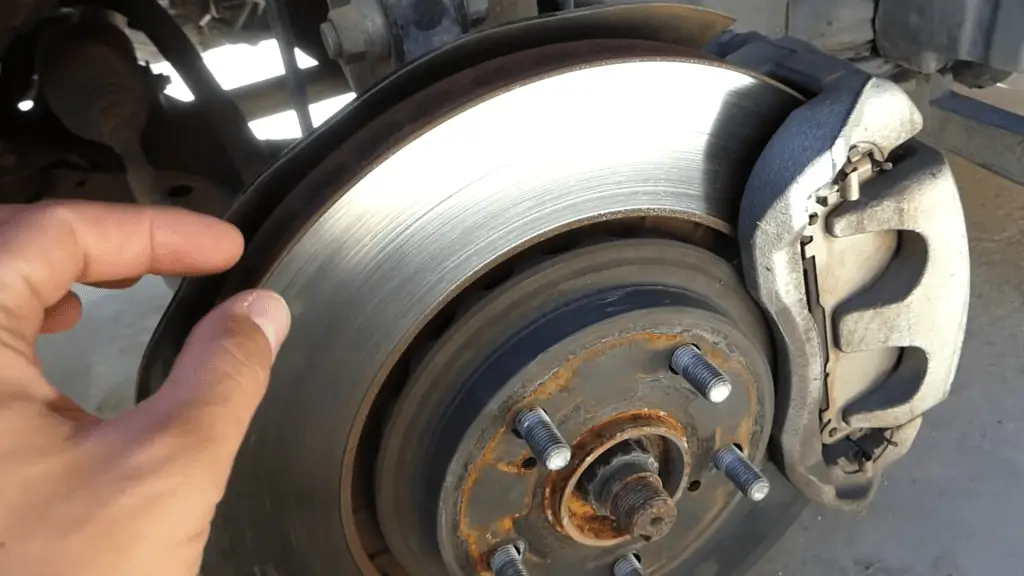
Contents
Why Do Car Brakes Vibrate?
You feel a shudder through the steering wheel, suspension, and brake pedal as you apply brakes at high speeds. Depending on the cause, vibrations can range from mild to violent.
There can be vibration from either the front or rear brakes or both. When you feel the shudder, it may indicate a problem with the brake. A vibration of the brake pedal tends to indicate a problem with the rear rotors, while a shudder of the steering wheel may indicate a problem with the front rotors.
When the shudder occurs in a particular place, you can determine whether it happens because of the front or rear brakes. A front rotor problem will often result in vibrations in the steering wheel, while rear rotor problems will result in vibrations in the brake pedal.
Understanding The Cause Of Brake Shudder When Hot
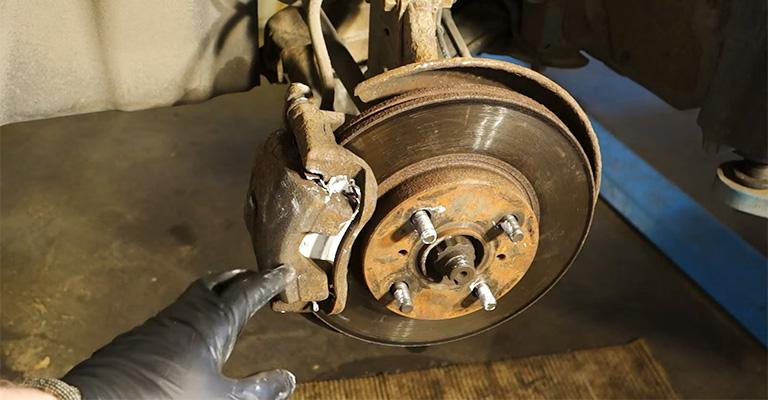
Sometimes, a vehicle doesn’t show any visible symptoms of brake shudder when cold but develops it when it warms up.
A common cause of disc rotor damage with hat-type discs is covered in this technical article. As a result, the disc rotor and hub mounting faces are precision machined to accurately ensure that the disc rotor is aligned with the brake caliper.
Without clean, flat faces on these 2 faces, it is impossible to mount the rotor accurately in terms of runout and support. The use of removal screws often complicates the removal of stubborn disc rotors. When cleaning the hub face, it is important to check for any burrs or damages that may have occurred.
Before refitting or replacing the disc rotor, removing the scale from the hub is advisable. The disc rotor will be stressed if the scale is not aligned with the removal holes when mounted.
Disc rotors will slightly distort as they heat up with use because of the uneven mounting surface applying stress. When the disc rotor becomes noticeably thin, this distortion causes brake shudder and noticeable DTV (Disc Thickness Variation).
It will leave an impressive mark on the mounting face if the scale hasn’t been removed from the disc rotor.
What Usually Causes Car Brake Vibration?
If your car’s brakes are vibrating, there are numerous reasons for this. 3 factors usually cause car brake shudders.
Imbalanced Brake Rotors
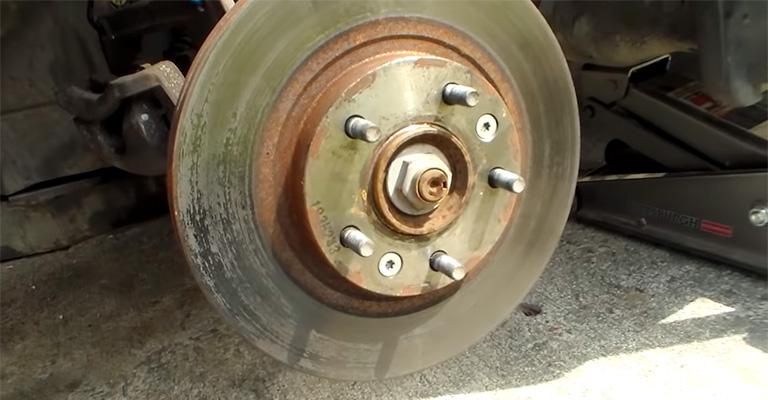
A brake pad must be in complete contact with the rotor to provide optimal stopping power. During braking, heat generated from the brakes can cause rotors to deteriorate unevenly from the outside. This can cause the brake pads to not meet correctly, resulting in vibrations in the car brakes.
Alignment Problems
When a vehicle is out of alignment, it can damage suspension components and prematurely wear tires, causing brake vibrations. Additionally, suspension components such as tie rods, ball joints, and wheel bearings can wear out with time, contributing to decreased braking power.
Subpar Brake Pads
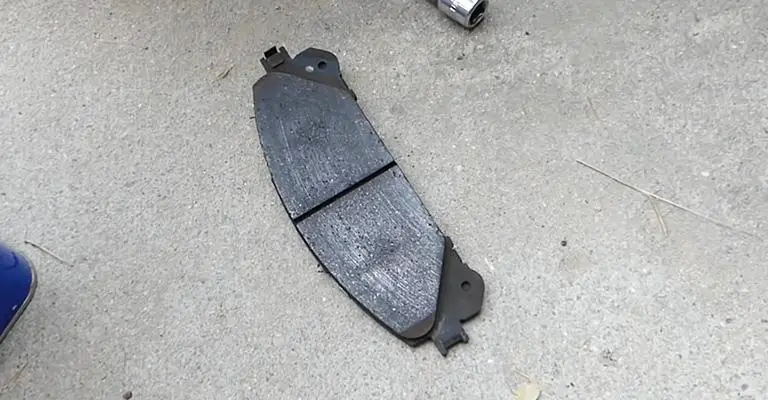
Brake vibration can occur when brake pads are worn out, damaged, or warped. Further, oil-covered pads may also produce vibrations when trying to catch the rotor.
Poor Brake Pad Condition
It is possible for brake pads that are worn, damaged, or warped to produce vibrations and squeaks, indicating that they need to be replaced. As brake pads attempt to capture the rotor, they can vibrate if they are contaminated with dirt, oil, or other toxins.
How to Fix Brake Shudder?
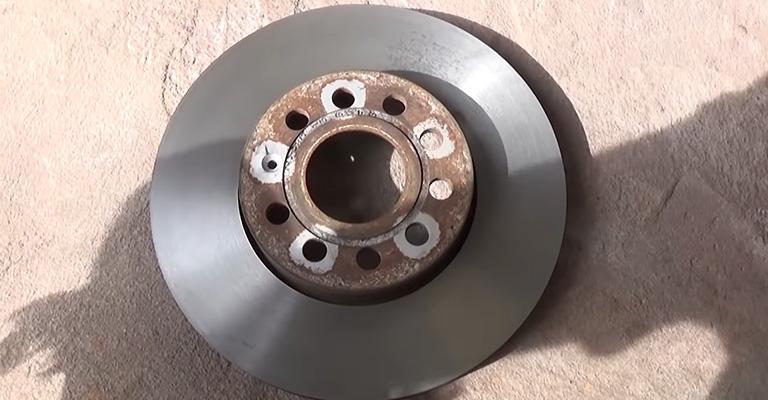
To eliminate shaking and vibrations when braking, a knowledgeable technician should inspect your vehicle to determine whether the replacement of brake pads, replacement of brake rotors, or alignment is necessary.
The simplest solution to your vehicle’s brake shudder may be a new set of brake pads. Some people find that replacing or resurfacing their brake rotors fixes brake shuddering.
While you’re replacing brake rotors, you may also want to consider replacing your brake pads.
Using old brake pads with new rotors creates undesirable driving conditions because the worn areas on the brake pads will not make contact with the smooth surface of the new rotors.
How To Avoid Car Brake Vibrations?
Some of the ways to tackle brake tremors in cars are listed below.
Use Good Quality Brake Components
There is a possibility of vibrations caused by brake components of lower quality, such as brake pads. To ensure that your parts last a long time and are heat-tolerant, it’s best to purchase high-quality components. Doing so will avoid issues such as quick wear and overheating.
Avoid Overusing The Brakes
A brake generates a great deal of heat because of friction. To avoid damaging the braking system, avoid overusing the brakes.
There is no problem with extreme temperatures when braking, but the brakes need to cool off between uses. Infrequent brake applications prevent the braking system from cooling down.
Driving Habits
The friction created while stopping your vehicle can cause brakes to create intense heat. A braking system becomes damaged over time by the heat created by friction.
Poor driving habits, excessive use, and poor-quality brake components can also cause the excessive heating of brake components. The brake pads of drivers who brake abruptly and speed from light to light can wear out much faster than those who brake slowly.
Even though brakes have been designed to withstand extreme temperatures and can cool down between uses, when the brake pedal is used frequently, it does not allow proper cooling to occur, resulting in a spongy brake pedal feeling.
If your brakes fade, they decrease the pressure in your braking system, which makes it more difficult for your vehicle to stop. The front brake rotors may be subject to scorch marks and unpleasant smells if overused. This will cause permanent damage, and they will need to be replaced.
Visit a Brake Professional
You don’t know how to do all that technical stuff? To get the best brakes, you need to consult a professional. An expert can diagnose and solve all linked problems associated with brake vibrations.
Final Words
When you press the brake pedal, you will feel a shuddering sensation from the car brake vibration. Depending on how vibration is caused, its intensity will vary.
Uneven rotors, alignment problems, and poor brake pads are the most common causes of brake shudder. Using premium brake components and avoiding overuse are two effective ways to mitigate brake vibrations.
Further, you can seek out brake repair experts for assistance in resolving brake vibration. You should address the vibration issue as soon as possible since it can lead to other more significant problems, potentially putting your life at risk.
